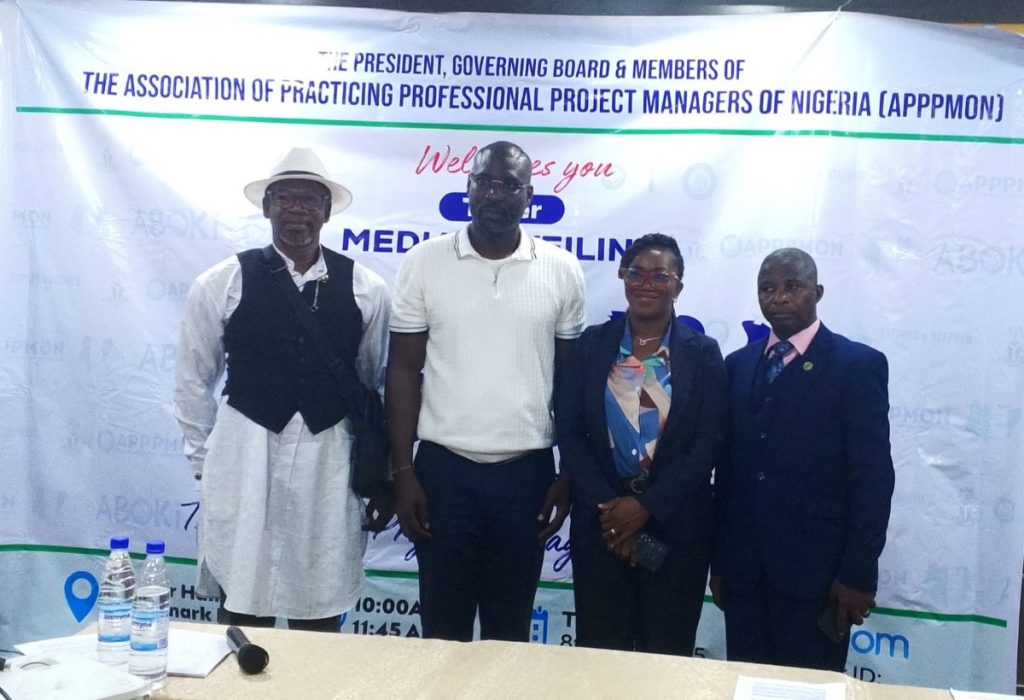
Mkpoikana Udoma
Port Harcourt — The Association of Practicing Professional Project Managers of Nigeria, APPPMON, has officially launched its Body of Knowledge and Innovation, ABOKI, a groundbreaking model framework designed to tackle Nigeria’s complex project challenges with local relevance and global alignment.
The formal unveiling took place in Port Harcourt, attracting top project management professionals, policymakers, media, and development stakeholders. The event signaled the birth of what experts are already calling Nigeria’s first comprehensive, homegrown project management system.
Engr. Yomi Matthew Ariyo, National President and Chairman of the Governing Board of APPPMON, said, “This is more than a document—it is a movement. With ABOKI, we are not just managing projects—we are managing change, complexity, and our collective destiny as a nation.”
ABOKI—an acronym for Accountability, Balance, Ownership, Knowledge, and Innovation—is positioned to revolutionize how projects are planned, executed, and evaluated in Nigeria. More than a compilation of theories, the framework reflects Nigeria’s lived realities and offers pragmatic methodologies tailored to the country’s unique challenges.
“ABOKI translates global best practices into local relevance. It addresses wicked problems—those complex, interwoven issues that have long undermined successful project delivery in Nigeria,” said Arc. Godswill Okon Edet Akpan, Chairman of the Media and Communication Committee, APPPMON.
He added, “From youth restiveness to infrastructure decay, Nigeria’s development issues defy simple solutions. ABOKI provides a contextual, dynamic approach rooted in Nigerian experience, culture, and values.”
Expanding the conversation beyond brick-and-mortar developments, Arc. Ramota Obagah-Stephen emphasized ABOKI’s adaptability to intangible projects such as scholarship initiatives, public orientation programs, and strategic communications.
“We must broaden our definition of projects to include ideas, initiatives, and social interventions that drive national development. With ABOKI, we can apply the same discipline and accountability to building people as we do to building roads.”
One of ABOKI’s most novel features is the introduction of new methodologies and models designed to reflect Nigeria’s realities. These include Project Evaluation and Audit Standards, PEAS, – a continuous auditing process that goes beyond post-project financial audits to include real-time assessments.
KETTLE Constraints Model – a contextual replacement of the traditional project management triangle, introducing six constraints: Knowledge, Economy, Time, Technology, Labour, and Ethics.
According to Dr. Inemi Erete Stephen, Lead Editor of the ABOKI Research Project, “KETTLE speaks to Nigeria’s truth. It addresses inflation, access to technology, bureaucratic delays, skill gaps, and the ethical rot that derail our projects. It is radical. It is real.”
Speakers at the unveiling called on stakeholders across sectors—government, private sector, academia, and civil society—to adopt and integrate ABOKI in their project frameworks.
“Let us turn ABOKI from a book into a culture. Let us no longer be a nation of abandoned intentions but a people who deliver, adapt, and sustain,” said Dr. Ariyo.
APPPMON also announced immediate next steps which includes launching an interactive ABOKI website as a knowledge and collaboration hub; initiating training and certification programs across sectors; creating editorial and regional clusters to ensure continuous content growth and adaptation.
The ABOKI launch marks a major leap for APPPMON, which was only established in December 2024. Born out of the collective frustration of project failures, the association now stands as a formidable body for professional excellence and innovation in project delivery.
“ABOKI is not a finished product. It is a living initiative. As technology, economies, and societies evolve, so will ABOKI. From AI to crypto, we are ready to embrace the future,”
said Arc. Akpan.



